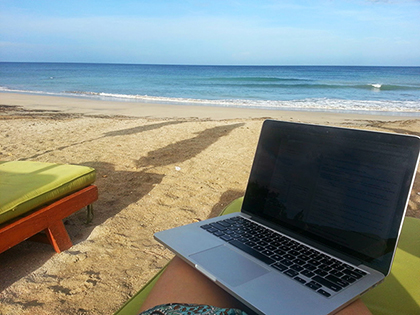I’ve been in Costa Rica for a week now; a few more days until I fly out.
Believe it or not, I came here for work. I spoke at a blogging workshop for the first five days, at the invitation of a publishing company. About a dozen attendees came to learn about blog writing and tour this beautiful country.
(True to my “one day of freedom for each day of work” philosophy, I decided that 5 days of speaking should be followed by 5 days of beach time. So here I am, literally writing this blog post from the beach.)
In speaking at this workshop, I fulfilled a decade-old ambition: I’m “getting paid to travel” for the first time.
My younger self would flip out if she could see me now.
When I was in college, I daydreamed about finding a job that would allow me to travel to exotic locales, spotting wildlife and sampling tropical cuisine.
Fast-forward a decade, and — voila! — that dream is now a reality. My 20-year-old self would be floored if she knew.
And I’m so grateful, so happy, so blessed.
And yet —
This experience confirms an idea that’s been kicking around in my head for years: “Get paid to travel” is the wrong dream.
In fact, “get paid to travel” doesn’t exist. It’s a myth. An illusion.
(But don’t worry — there’s a stronger, better dream that you can embrace, if you want to. One that’s more honest, more authentic. Read on.)
An Important Lesson I Had to Learn The Hard Way …
Let’s rewind for a moment.
During college, I was constantly scheming ways to travel.
I wanted to go overseas. The context didn’t matter. I was young and inexperienced, and had no grasp of “context.”
Like many students, I looked into study abroad. But those semester-long programs bore steep 5-figure price tags. Gulp!
Then I realized I didn’t want the “study” — I just wanted the “abroad.” It would be a LOT cheaper to just save enough to buy a plane ticket after graduation, live somewhere for six months, and find some odd jobs to support myself.
I told my parents, who asked a logical follow-up: “What would you do there?”
I shrugged. “Maybe bartend?”
As you can imagine, that answer didn’t blow over too well.
My dad said that if I really wanted to travel, I should look for a “professional” career that would allow me to live overseas.
So my senior year, I started browsing those opportunities: The State Department. International nonprofit work. News reporting.
The State Department seemed too bureaucratic, and the global nonprofit sector seemed too competitive, so I decided to foray into journalism, figuring I’d one day become an international correspondent. To break into the field, I accepted a job as a reporter at the local newspaper, figuring that it was the first stepping stone in what would become a long and illustrious career in print media. (Ha!)
But my timing was terrible. The newspaper industry was drying up. Jobs were scarce; my possibility of landing a staff position at a major-market daily seemed slim.
After a few years, I recognized the folly in waiting around for a White Knight (your boss) to make your dreams come true. I had placed fate into the hands of gatekeepers.
If I really wanted a freedom-soaked lifestyle filled with travel and adventure, I needed to knock down the gate.
So I quit my job in 2008, and the rest is history. I haven’t been employed since, yet my income has quadrupled. I make six-figures from my laptop and I’ve traveled to more than 30 countries, spending as much time in each locale as I want.
(Like I said, my 20-year-old self would totally. flip. out. if she could look into a crystal ball and see the future me. Life has turned out far better than I’d imagined possible.)
In the process of creating all of that, though, I forgot about my original scheme, the trigger which started it all — which was that College-Senior-Paula was plotting ways she could to “get paid to travel.”
I forgot that’s what I’d wanted — until it happened. This current trip to Costa Rica is the first time I’ve ever traveled overseas for work.
And it makes me realize: That whole idea is an illusion.
Nobody gets paid to travel. We get paid for the value we bring to the trip.
And that’s where our focus needs to be.
I’m not literally getting paid to receive a passport stamp. I’m here because — (hopefully) — I can impact others and change lives through writing, speaking and teaching.
There’s a famous quote by business leader Jim Rohn — “You don’t get paid for the hour. You get paid for the value that you bring to the hour.”
The same applies here. You don’t “get paid to travel.” You get paid for the value that you bring to the trip. (If you like that, Tweet it.)
Look for Freedom, Not Commands
But hold on!
There’s more.
If we’re getting paid for creating value — and if our work transfers across boundaries — then it doesn’t matter where we are when we create that value.
“Huh?”
Okay, hear me out:
On a day-to-day basis, I work from my laptop. I could be in Kuala Lumpur or Kansas City; my location is irrelevant.
And that flexibility — combined with a good income (and strong savings) — creates far, far more freedom than any other work arrangement.
In other words –
The goal shouldn’t necessarily be “get paid to travel.” Because that — by itself — doesn’t create optimal freedom.
If I had a boss telling me to fly to Egypt for a news assignment, he’d also tell me what to do when I get there. And when to fly home. And where to fly next.
I’d be living on his terms.
But if you change the goal to “earn money from anywhere,” the game changes. Now you have the freedom to call the shots.
Context matters.
I didn’t understand this when I was 20. I thought “travel” was the same, regardless of whether it was studying abroad, working odd jobs to support myself while backpacking Europe, or representing the State Department.
Now I understand how different each of those experiences would be.
Context matters.
The old notion of “getting paid to travel” is premised on the assumption that someone else issues the command.
Don’t make that your sole goal.
Command yourself.

